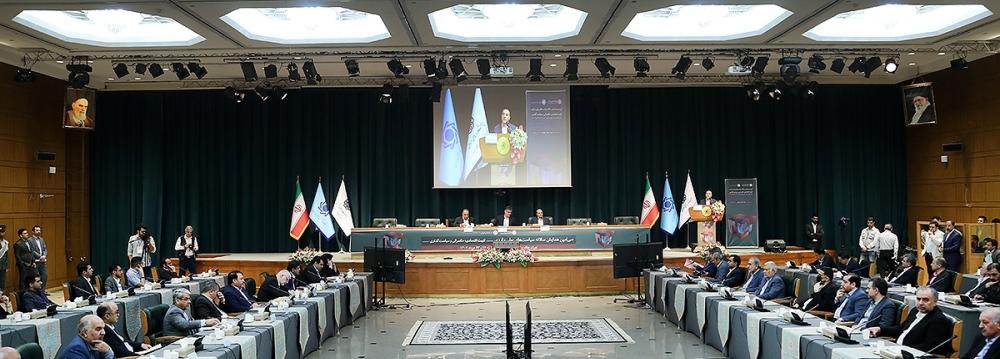Mohammad Reza Farzin, the governor of the Central Bank of Iran, said Monday the steep fluctuations in forex rates are to blame for the ongoing economic instability and the regulator is doing its best to stabilize the rates to be able to control runaway inflation.
"Stabilization policy is government and CBI-designed policies and actions during a period of economic instability (recession, inflation, unemployment, debt crisis…) to restore economic stability. Our ultimate goal is to tame inflation," Farzin was quoted as saying in the opening ceremony of the 30th Annual Conference on Monetary and Exchange Rate Policies in Tehran.
"We are committed to unambiguously announce policies and implement the same transparently."
Regarding the policymaking domain and intervention to help curb instability, he said, "We simply cannot sit back until the economy stabilizes; intervention is key to foster stability."
"We have a program to control inflation and boost domestic production approved by the government. Indeed we are not oblivious to discipline in that monetary and fiscal policies must be in harmony and compatible to be effective."
The senior banker went on say that "The exchange rate swings are a concern for all, although it has declined in recent weeks. Steep fluctuations in currency rates mean instability."
High and rising rates and demand for currency in the unofficial market is largely due to smuggling, capital flight, and the concept to hedge against potential future losses, he added.
Regarding the sources of currency supply in the non-official (black) market, he said, "The main sources include smugglers of goods, firms exporting goods and services."
Some refer to the non-official market as a free market, while no market exists without regulations and control, he said, “International forex markets are regulated where no one can engage in currency smuggling without being identified and detected."
Unofficial currency markets provide oxygen for speculation and “unfortunately, social media is being used to set unreal exchange rates,” he complained.
"When fake news or baseless statements disrupt the market, it means that the forex market is highly unstable. “Fluctuations in the dollar price in the unofficial market are basically driven by expectations that change mostly under the influence of political developments and/or reports on the [US] sanctions.
The governor emphasized the need to break the cycle of fear and inflation in the market saying that the increase in exchange rates leads to an increase in asset value and demand for money, which by extension increase money supply, ultimately leading to galloping inflation.
Inflation leads to a cycle of fear and anxiety in the markets, which endures unless broken. One of the three main pillars of economic stabilization policies is maintaining stability and predictability in the forex market. Without predictability stabilization policies will be an exercise in futility, he noted.
The second pillar is controlling liquidity, which is achieved through effective monetary and fiscal policies.
The last crucial pillar is strengthening the regulatory system in financial markets, including monetary and credit markets, according to the CBI chief.
Intervention
The governor emphasized that intervention in the foreign exchange market and efforts to stabilize the exchange rate are the norm in central banks around the world.
In response to calls for a floating exchange rate, he stated that they its advocates should look at the experience of other countries and see which countries use a floating rate. “Most countries intervene and stabilize exchange rates. Minus this, there will be no confidence.”
“From 2018 to 2022, we had between 6 and 8 different exchange rates…We have managed to reduce it, although the high number of rates was mostly due to the sanctions and currency problems.”
Farzin reiterated the need and significance of workable market policymaking and regulation to help stabilize currency rates. “Forex for importing essential goods is being provided at 28,500 rials to the dollar…allowing importers to plan for their future.”
In another part of his speech, he outlined recent achievements, including the reduction in the repatriation of export revenues from 125 days to 80 days, addressing the real demand for foreign currency, shorter time for currency allocation for essential goods, medicine and medical equipment plus gold imports.
The CBI has over $100 billion in foreign reserves, although part of it is in other countries, the top banker said. “We have started to utilize the reserves with the help of our embassies and make renewed efforts to access the reserves wherever they are.”
The CBI has activated an alternative messaging system in the Asian Clearing Union through economic diplomacy to cooperate financially with countries such as India, Pakistan, Belarus, and other countries.
Inflation
Farzin emphasized the effective measures taken to combat inflation, and said that there has been a significant decline in the consumer price index (CPI) from 62.4% in the month to April 21 to 50% in month to May 21. Furthermore, “it is projected that there will be a substantial drop in this index in the coming months, reaching our target of 30%.”
Economic conditions will improve this year and “we are committed to stabilization and controlling liquidity and inflation.”


